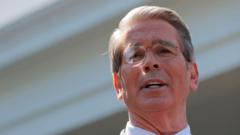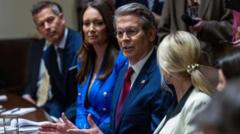In a recent move to challenge water efficiency regulations, President Trump has signed an executive order aimed at reversing restrictions on showerhead water flow limits established under the Obama administration. By directing the energy secretary to rescind these regulations, Trump emphasizes a desire to enhance water pressure and consumer choice while critics highlight concerns over environmental implications.
**Trump Aims to Rescind Shower Water Flow Regulations in Latest Executive Order**

**Trump Aims to Rescind Shower Water Flow Regulations in Latest Executive Order**
President Trump announces plans to reverse water flow restrictions for showerheads, inciting debate over water conservation and consumer choice.
The new directive proposes rolling back water flow limits on multi-nozzle showerheads, which were previously capped at 2.5 gallons per minute collectively. Trump states that these constraints serve a "radical green agenda" detrimental to everyday Americans. The redefinition introduced during Obama’s presidency mandates that this limitation applies collectively to multi-nozzle installations, a move Trump's administration views as excessive regulation.
During the executive order signing, Trump voiced frustrations over the time it takes for his hair to fully wet, portraying these regulations as impractical. "No longer will showerheads be weak and worthless," he declared, contending that the changes will restore Americans' freedom of choice regarding their household fixtures.
Opponents of the new order, including various consumer and conservation groups, argue that rescinding these regulations could lead to wasteful water consumption, with the Appliance Standards Awareness Project emphasizing the need for standards that work toward protecting the environment and saving consumers money on their bills.
This executive move marks a significant reversal in U.S. policy surrounding household water usage. It reflects a broader clash between differing political philosophies—conservative advocacy for deregulation and consumer freedom versus progressive prioritization of environmental sustainability and communal resource management. The Department of Energy is expected to publish a notice rescinding the current definition within 30 days, paving the way for potential increases in household water usage.
As the nation navigates this contentious issue, Trump’s order illustrates ongoing divisions around energy policy and consumer rights, reminding the public of the broader discussions surrounding resource management. The decision is positioned as a choice against federal regulation in pursuit of personal freedom, but with potential consequences for water conservation efforts.
During the executive order signing, Trump voiced frustrations over the time it takes for his hair to fully wet, portraying these regulations as impractical. "No longer will showerheads be weak and worthless," he declared, contending that the changes will restore Americans' freedom of choice regarding their household fixtures.
Opponents of the new order, including various consumer and conservation groups, argue that rescinding these regulations could lead to wasteful water consumption, with the Appliance Standards Awareness Project emphasizing the need for standards that work toward protecting the environment and saving consumers money on their bills.
This executive move marks a significant reversal in U.S. policy surrounding household water usage. It reflects a broader clash between differing political philosophies—conservative advocacy for deregulation and consumer freedom versus progressive prioritization of environmental sustainability and communal resource management. The Department of Energy is expected to publish a notice rescinding the current definition within 30 days, paving the way for potential increases in household water usage.
As the nation navigates this contentious issue, Trump’s order illustrates ongoing divisions around energy policy and consumer rights, reminding the public of the broader discussions surrounding resource management. The decision is positioned as a choice against federal regulation in pursuit of personal freedom, but with potential consequences for water conservation efforts.























